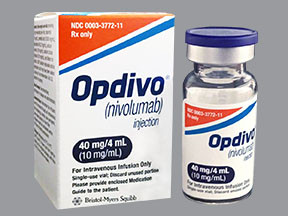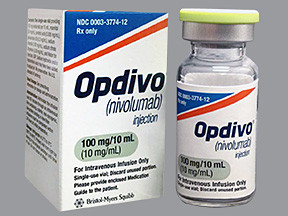NIVOLUMAB - INJECTION
PHONETIC PRONUNCIATION: (nye-VOL-ue-mab)
COMMON BRAND NAME(S): Opdivo
GENERIC NAME(S): nivolumab
Uses
USES: Nivolumab is used to treat cancer. It works by changing the action of your own immune system, directing it to attack cancer cells. Nivolumab belongs to a class of drugs known as monoclonal antibodies.
How to use NIVOLUMAB - INJECTION
HOW TO USE: Read the Medication Guide provided by your pharmacist before you start receiving nivolumab and each time you get a treatment. If you have any questions, ask your doctor or pharmacist. This medication is given by a health care professional. It is injected slowly into a vein over 30 minutes. It is given as directed by your doctor, usually once every 2 to 4 weeks. Infusion reactions may happen while you are receiving the drug. Tell your doctor right away if you have symptoms such as fever, chills, flushing, dizziness, or fainting. The dosage is based on your medical condition, weight, and response to treatment. Your doctor may stop your treatment for some time if you get serious side effects. Your doctor may also prescribe another medication (a corticosteroid such as prednisone) to help treat side effects of this medication.
Side Effects
Precautions
Interactions
Overdose
Images
Reviews
Faq for NIVOLUMAB - INJECTION
Nivolumab is a type of immunotherapy medication that is administered through injection. It specifically targets certain proteins in the body to help activate the immune system against cancer cells.
Nivolumab works by blocking the PD-1 protein on immune cells, which allows the immune system to recognize and attack cancer cells more effectively.
Nivolumab is approved for the treatment of various types of cancer, including melanoma, non-small cell lung cancer, renal cell carcinoma, bladder cancer, head and neck cancer, Hodgkin lymphoma, and certain types of colorectal cancer.
The frequency of Nivolumab injections depends on the specific cancer being treated and the individual's response to the medication. In general, it is administered once every two to three weeks.
Common side effects of Nivolumab include fatigue, rash, itching, diarrhea, nausea, decreased appetite, constipation, and muscle or joint pain. However, it is important to note that not everyone experiences these side effects and some individuals may experience more severe side effects.
Yes, Nivolumab is often used in combination with other cancer treatments, such as chemotherapy or targeted therapy, to provide enhanced efficacy against cancer cells.
The duration of response to Nivolumab varies depending on the type and stage of cancer being treated. Some individuals may experience a long-lasting response, while others may require periodic re-treatment.
Coverage for Nivolumab may vary depending on individual insurance plans and the specific indication for which it is being used. It is advisable to consult with insurance providers to determine coverage eligibility.
Nivolumab should not be used in individuals who are hypersensitive to the drug or any of its components. It is important to inform healthcare providers about any pre-existing medical conditions or ongoing treatments to ensure safe and appropriate use of Nivolumab.
Disclaimer
IMPORTANT: HOW TO USE THIS INFORMATION: This is a summary and does NOT have all possible information about this product. This information does not assure that this product is safe, effective, or appropriate for you. This information is not individual medical advice and does not substitute for the advice of your health care professional. Always ask your health care professional for complete information about this product and your specific health needs.



No Reviews Yet